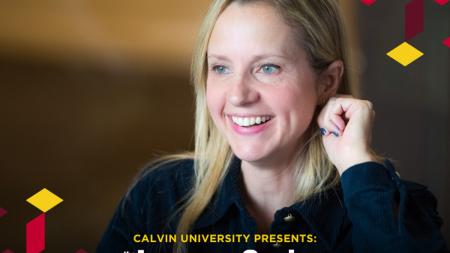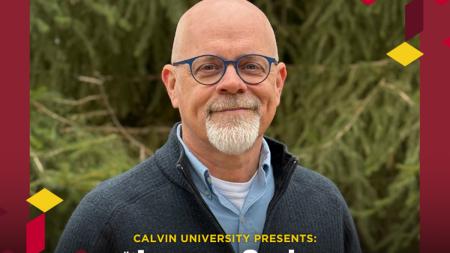Singing God’s Grace: Reflections of a Conductor

Pearl Shangkuan has served in Calvin University’s music department for over 25 years, and she will retire this spring from her role as director of choral activities there. In her January Series presentation Feb. 2, Shangkuan shared stories, insights she has gained, and lessons she has taught her students during her career.
Shangkuan noted that in a musical composition, parts of preceding movements are often brought back in at the end of the work. In a way, she said, her presentation would follow that pattern, echoing what her “students have heard and experienced” in her “classes, rehearsals, and performances” over the past 25 years.
Describing her childhood, Shangkuan recalled that seeing her father on his knees in prayer every morning and evening helped her recognize that prayer was the source of his strength and success. He was a man of big ideas, she said, and he encouraged his children to identify their talents and develop them for God’s glory. Her mother took care of day-to-day details related to meals, driving to piano lessons and rehearsals, and appointments.
“I’m forever grateful to have had these two different approaches that have greatly influenced the balance of creativity and practicality in my life,” said Shangkuan.
Balance is essential in music too, she noted. In a concert we see the movement of the conductor, and we hear the choir and instruments, but we don’t see the work and tuning that has happened behind the scenes to create the beauty of the performance. Shangkuan explained that in life, as in music, we need tuning. She spoke of tuning our minds, ears, and hearts to sing God’s grace.
Pointing to 2 Chronicles 5, which describes how the ark of the covenant was brought into the Lord’s temple in Jerusalem to a chorus of praise from musicians and priests, Shangkuan noted the staggering number of artistic details and rehearsal logistics that would have been involved in the event. In response, the temple was filled with the glory of God.
“This has always been my aspiration for my students and myself – that we humbly offer to God our absolute best,” she said. “That takes work and commitment. And may God find it a pleasing sacrifice.”
Shangkuan expects her students to put in the work needed to become a well-trained ensemble and to be better singers and musicians at the end of each semester than they were at the beginning.
Choosing songs for her choirs each term, Shangkuan said she incorporates songs in different languages, from different cultures, and from historical as well as modern composers.
Songs from other cultures, she said, can give us a glimpse of another community and let us put ourselves in their shoes for a moment. Such songs also help us to gain a sense of the great gathering before the throne of God described in Revelation 7.
Songs from history, Shangkuan added, bring perspective from past ages and make use of a rich history of choral music based on sacred texts. Medieval chants and newer forms born in the Renaissance in Europe can teach us about the steadfast grace of God through the ages.
“These two perspectives, historical and global, come together in the shape of a cross,” suggested Shangkuan, holding up her arms to emphasize the image. This models “the grace of God through the length of time and breadth of space,” she said. For “every program that I’ve done here at Calvin, its foundation has been the cross, like a cathedral floor plan.”
Singing in a choir, she reflected, requires that each singer knows the starting pitch and listens to the singers around them. “At the start of each rehearsal,” Shangkuan said, “my students hear me play an A or an A-major chord on the piano. I ask them to imagine if an orchestra concert started without the instrumentalists having tuned to the A from that oboe. What would the music sound like? In our spiritual life, we must tune to the A of God’s Word. Feelings fluctuate, but God’s Word, according to Psalm 12, is flawless. This tuning needs to be done often, even daily.”
Like manna in the story from Exodus 16, she said, God calls us to find in him what we need for each day. We can’t hoard his grace for the future; we must return to him each day. Shangkuan said she does this by going to a certain corner of her house every morning “to sit, and listen, and tune – to gather the manna for the day.”
In choral singing, a unified sound is achieved when every singer hears and produces the same center of the pitch and forms the vowels in the same way. To achieve this unity, the singers must listen intently to each other, said Shangkuan.
In life and in music, she advised, “Don’t substitute volume for artistry.” She said that when she attends a concert, she listens most carefully to the softest passages, as that’s where the level of craft is most evident. In our culture, she said, the loud, belligerent, outrageous voices get attention, but God demonstrated to Elijah in 1 Kings 19 that often his voice is in the gentle whisper, rather than in the mighty wind, earthquake, or fire.
In worship services, she said, we can reflect these insights by choosing instruments and making amplification choices that allow congregational voices to be heard – and even times of silence. And in life we can give ourselves time without devices and distractions, making space for the beats of rest that give definition and shape to our days.
During a difficult time in the life of her family, Shangkuan said, when her son frequently needed treatments at a children’s hospital, she found the truth of the need to listen when a 10th-century chant reminded her, “Where love and charity are, there God is.”
Looking around there at the love of parents for their children, and of children for their parents, and at the care that doctors and nurses gave their patients, Shangkuan said, she realized that “in such a place, there God is.”
We tune our hearts to God when we plant seeds of his Word in the soil of our hearts, she added. Shangkuan said that she chooses songs carefully for this purpose:
“I tell my students that while they are now young, it’s for when they're 30, 40, 55+ years that I plan for, that the texts planted in their hearts through the choral music that we sing may bear fruit in their lives. I tell them it’s not if but when hardships in life come. And during those times of need, what will they draw upon from their repository that will bubble up and help carry them through?”
With this in mind, Shangkuan said, she always chooses a few hymns for her students’ repertoire. “These beloved songs of faith have endured through turbulent times in human history and were often written in response to great personal tragedies,” she said. “Alongside the Bible, these songs have been invaluable in the teaching and absorbing of scriptural truths.”
Shangkuan described an afternoon in Rome when she entered a small baroque church to escape the afternoon heat. The beauty of the space made her gasp, she said, and helped her see that the whys of life will fade in comparison when we stand before the who that we worship. She said she hopes that the songs her choirs sing will help others enter into the splendor of God’s presence in a similar way.
Twenty-three choral students joined Shangkuan on the stage to premier “A Choral Prayer” written by Roy Hopp as Shangkuan’s final song commissioned for a Calvin choir. The text, adapted from Psalm 141, sings, “Alleluia. . . . Let our songs be set forth in your sight as incense, the lifting up of our voices as a pleasing sacrifice. Alleluia. Amen.”
Shangkuan shared two stories from the many travels that she and Calvin University’s choirs have undertaken to nearly every inhabited continent over the years. In South Africa, she said, they visited Robben Island, where Nelson Mandela had been imprisoned for 18 years for his actions against apartheid. After the choir had seen his jail cell, they gathered in the yard and sang an arrangement of “Amazing Grace.”
As they sang, the white Afrikaans tour leader put his arm on the shoulder of the black South African site guide. “We could hardly sing through the tears in our eyes, seeing such a powerful, vivid expression of God’s grace that made this kind of reconciliation possible,” said Shangkuan.
And at the end of a tour of South Korea and China, as the choir waited in the boarding area of the airport for their flight home, they wanted to sing once more. They began singing “Lift Thine Eyes” from Mendelssohn’s Elijah. Across the room, a man looked up in surprise, then put his face in his hands and wept. He later explained to Shangkuan that his 15-year-old daughter had loved choir and swimming. But one day as she stepped out of a pool, she died. Since then, he hadn’t been able to bring himself to attend another concert. Hearing their song in the airport, far from home on a business trip, said Shangkuan, he felt God’s arms of grace reaching out to him and found a measure of healing.
Shangkuan encouraged parents and decision makers in churches and places of education to continue to create music, to develop opportunities for young people to sing and learn, and to promote excellence in what they offer to God.
She noted that fine arts are often the first programs to get cut when budgets shrink – but it takes so little to dismantle a program and so much to rebuild, if that can be done at all.
“I am here today because my second-grade teacher told this incredibly shy kid that she could sing. I’m here today because the church where I grew up had a children and youth choir program and the youth groups offered many opportunities for leadership roles. I’m here today because I joined a community children’s choir that toured internationally and forever shaped my life,” she said.
The lessons of her childhood, said Shangkuan, of identifying the talents God has given her and of using them to serve, have stayed with her. She concluded, “When I’m on the [conductor’s] podium, be it at Carnegie or in a dilapidated church in a poor township in Soweto, South Africa, I give back to God the one talent he’s given me – for it is from him, through him, and to him that I can do this. The sum of my songs is ‘He is all. Alleluia. Amen.’”


